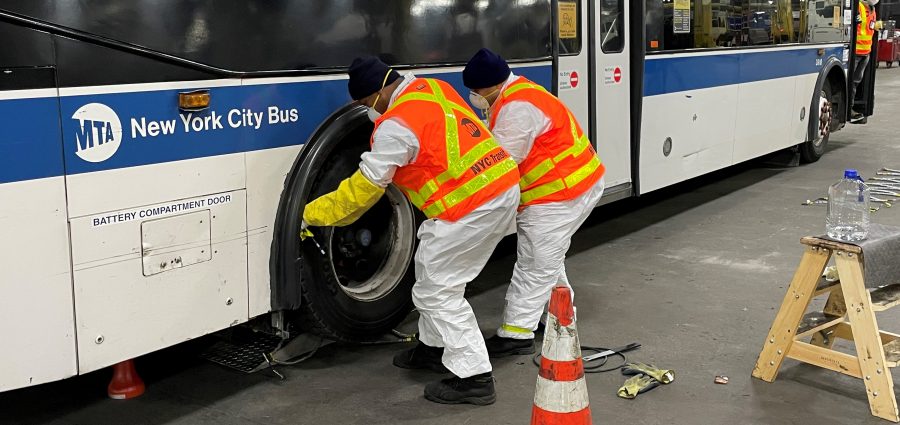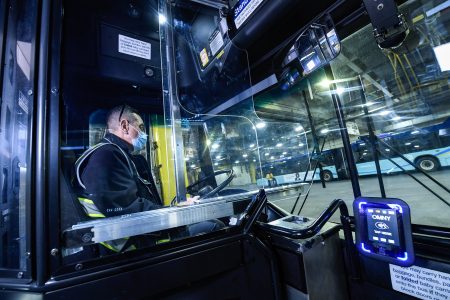With Monday’s winter storm expected to bring more than a foot of snow, heavy winds and potential coastal flooding, the Metropolitan Transportation Authority (MTA) today issued an update on agency-wide preparations being made to keep customers and employees safe while delivering as much reliable service as possible.
Long Island Rail Road will run a weekend schedule on Monday and Tuesday and Metro-North late-night service will end early on Monday evening.
MTA Bridges and Tunnels will implement an empty and tandem tractor trailer ban beginning at 06:00 a.m. on Monday.
Buses are being outfitted with tire chains and will run on a reduced schedule.
The MTA urges customers to stay home and avoid unnecessary travel during the storm. MTA employees will be spreading salt and clearing surfaces of snow and ice, keeping signals, switches, and third rail operating; will remove any downed trees that may fall across tracks; and will attend to any weather-related challenges during the storm.
“This is a serious winter storm with high snow fall levels predicted,” said MTA Chairman and CEO Patrick J. Foye. “MTA employees will be working hard over the next 48 hours and beyond to prepare for and respond to the storm. Even still, we strongly recommend New Yorkers stay home, stay safe and avoid unnecessary travel on Monday and Tuesday until the storm subsides.”
“The safety of our employees and customers is our number one priority, and we want to make sure that essential workers are able to get to where they need to be throughout this storm,” said Mario Péloquin, MTA Chief Operating Officer. “Our agencies are well prepared for winter events and are ready to respond quickly as the weather dictates.”
“We’ve been preparing for this storm for days which puts in a good position to respond as weather forecasts change,” said Sarah Feinberg, Interim President, MTA New York City Transit. “We are prepared for customers to be out in the system, but better if you can stay home to avoid unnecessary travel.”
“Our team has been working hard to ensure that we are ready for the storm and will be coordinating closely with our partners at the New York City Department of Sanitation to make sure that bus routes are passable and bus stops are usable,” said Craig Cipriano, President of the MTA Bus Company and Senior Vice President for Buses, MTA New York City Transit. “We will carefully monitor roadway conditions throughout the event so we can respond nimbly. We urge customers to check new.mta.info or our apps for the latest service updates before traveling.”
“Crews at New York City Transit have been preparing for this storm all weekend and will be in place to keep tracks and stations clear of snow and ice, so our system can continue to operate safely,” said Demetrius Crichlow, Acting Executive Vice President & Chief Operating Officer, New York City Transit Department of Subways. “Express service may be impacted by snow and wind, so customers are encouraged to check for service changes before they travel.”
New York City Subway & Staten Island Railway
While the underground portions of the subway system remain unaffected during snowstorms, there are nearly 220 miles of outdoor track throughout the boroughs. The Rockaway 
 , Sea Beach, Flushing
, Sea Beach, Flushing  , Brighton
, Brighton 
 and Dyre Avenue
and Dyre Avenue  lines are particularly vulnerable to snow and freezing precipitation. To prevent subway trains from being blocked in yards, they will be moved and stored underground in anticipation of heavy snow or ice. This will impact service on lines with express service.
lines are particularly vulnerable to snow and freezing precipitation. To prevent subway trains from being blocked in yards, they will be moved and stored underground in anticipation of heavy snow or ice. This will impact service on lines with express service.
New York City Transit has a fleet of snow and ice-fighting trains designed to keep outdoor tracks, switches and third rails clear of snow and ice. High-powered snow throwers, jet-powered snow-blowers, and de-icing cars – retired subway cars modified with tanks and other specialized equipment to spray de-icing fluid on the third rail – are ready for immediate deployment.
New York City Buses
Due to predicted high levels of snow accumulation, buses will operate reduced service. All local buses will be fitted with tire chains. Sixty-foot articulated buses will be replaced with 40-foot standard buses starting Sunday night.
New York City Transit and the MTA Bus Company have 35 snow-fighting vehicles in its fleet, which operate on predetermined routes to quickly reach terminals, lay-over locations, and other highly trafficked areas and known hotspots.
Bus managers have technology that tracks service when it falls below minimum expected levels on any route, allowing them to make decisions more quickly. Bus service will be adjusted based on road conditions around the city and service curtailments on a route-by-route basis are possible.
MTA New York City Transit’s Department of Buses and the MTA Bus Company have the following equipment and supplies on hand to fight the storm:
- more than 800,000 gallons of diesel fuel;
- more than 338,000 pounds of de-icing material;
- 28,000 gallons of gasoline;
- 83 box trucks;
- 77 truck-mountable snow plows / salt spreaders;
- 57 portable snow blowers / throwers;
- 40 emergency response vehicles / road service trucks;
- 25 tow trucks;
- 35 road trucks;
- 36 bucket trucks;
- 22 dump trucks;
- 14 portable generators;
- 2 fuel tanker trucks.
MTA Bridges and Tunnels
MTA Bridges and Tunnels personnel have activated full inclement weather preparedness for all facilities. Staffing will be maintained at level necessary to fight the storm with up to 300 employees engaged in weather-related activities.
Due to expected high wind conditions, a ban on empty tractor trailers and tandem trucks will be in effect on all MTA bridges starting at 6 a.m. on Monday, February 01, 2021. Bridges and Tunnels will be closely monitoring the weather and implement additional appropriate restrictions as needed. Pedestrian walkways at the RFK, Henry Hudson, Marine Parkway, and Cross Bay Bridges will be closed starting at 06:00 p.m. Sunday night, January 31, 2021.
Fleet Operations garages will be activated throughout the storm maintain the availability of all storm-fighting equipment and material including:
- 8,100 tons of salt;
- 50 portable snow blowers / throwers;
- 74 truck mountable snow plows / salt spreaders;
- 45 portable generators;
- 31 front loaders;
- 31 wreckers / tow trucks;
- 25 variable message signs;
- 23 bucket trucks;
- 17 weather monitoring stations;
- 14 light tow vehicles;
- 12 chainsaws;
- 10 forklifts;
- 10 torches;
- 10 car carrier trailers.
Bridges are equipped with embedded roadway sensors for temperature and above-ground atmospheric sensors that deliver real-time information on wind velocity, wind direction, humidity and precipitation via wireless communication. These sensors record data used to determine if speed restrictions are necessary.
Flooding conditions will be closely monitored and appropriate mitigation measures will be put into place as needed. All non-critical roadwork will be suspended during the storm with contractors on-site and/or available to assist with weather-related response and mitigation.
Commuter Railroads
The Long Island Rail Road and Metro-North Railroad are amending service plans in advance of the storm, and may amend them further depending on storm conditions. Details are below.
Snow-fighting equipment is winterized, tested and positioned strategically throughout both railroads. Protective heat circuits are being verified to be operational, air brake lines are being purged of any moisture to prevent them from freezing, and electric trains are being fitted with special third rail shoes to prevent snow from accumulating.
Metro-North Railroad
Service will end early on Monday, February 01,2021, with the day’s final trains departing their origins as early as 09:39 p.m. and arriving at their final destinations after midnight. To view final train departures at individual stations customers should visit mta.info or use the Metro-North Train Time or MYmta apps.
Metro-North is closely monitoring conditions and may further modify or suspend service if snowfall is heavy. In ice storms, blizzards, or sustained winds over 39 mph, train service may be severely curtailed or suspended, especially if there are frozen switches, downed trees, or a loss of third rail or overhead catenary power.
Metro-North Railroad installed third rail snow shoes on its electric trains to scrape ice off of exposed third rails, is shrouding exposed train couplers with snow covers to keep snow out, is treating exposed shoes with deicer, and is spraying door panels with anti-freeze agent.
Metro-North Railroad has snow-fighting equipment ready to go, strategically located at facilities around the system.
Switches – the interlocking tracks that allow rail traffic controllers to route trains from one track to another – are being treated with an anti-freeze agent and lubricated. Metro-North Railroad uses electric switch heaters.
Long Island Rail Road
Starting Monday at 12:01 a.m., LIRR trains will operate on a weekend schedule, which will remain in effect through Tuesday night. This will help us run the best service possible as the storm intensifies and we work to clean the rails. Due to the extreme cold currently hitting the service territory, LIRR station waiting rooms will remain open through Wednesday, February 03, 2021.
The LIRR is closely monitoring weather forecasts as the upcoming storm nears its service area and may further modify or suspend service if snowfall is heavy. In ice storms, blizzards, or sustained winds over 39 mph, train service may be severely curtailed or suspended, especially if there are frozen switches or there is a loss of third rail power.
The LIRR reminds customers to travel only if necessary on Monday and Tuesday. Railroad crews will be out across the service territory working to keep trains moving for those who need them. Those who must travel are urged to be cautious on station staircases/platforms and when boarding/exiting trains. Customers who are planning to travel are encouraged to check the LIRR TrainTime app, MyMTA app, or new.mta.info, for the latest service information.
Access-A-Ride
Access-A-Ride paratransit service will continue to provide service, with behicles using tire chains and all-weather tires, although shared trips and feeder service will be suspended during the storm. Reservations are being accepted on a 24-hour booking cycle instead of the usual 48-hour booking cycle. Customers may experience additional travel and wait times. Customers may want to reconsider travel, unless medically necessary. The Paratransit Command Center will be monitoring the storm to track and respond to immobilized vehicles and customers.
New York City Transit has coordinated a procedure with New York City first-responders and the NYC Office of Emergency Management for rescuing customers on immobilized vehicles or those who develop medical needs during storms.
Real-Time Service Updates
Customers should check the service status of their subway or train line or bus route before they travel at new.mta.info or on the MYmta app. Modified emergency schedule details for commuter railroad customers are also available through the LIRR Train Time and Metro-North Train Time apps.
.









